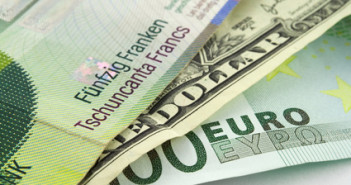In the euro-zone, unemployment is rising, inflation is falling and the debt crisis is still weighing. However, the ECB’s incentive to cut interest rates could come from a different direction: the unwinding of the LTROs, says Simon Smith of FxPro.
In the interview below, Smith also discusses the gap between Japanese rhetoric and deeds, the waning impact of Mervyn King on the MPC and other topics that move currency markets.
 Simon has over seventeen years experience of macro forecasting and investment strategy research. Prior to joining FxPro in May 2010, Simon was a consultant with Thomson Reuters, having spent four years as Chief Economist at Weavering Capital.
Simon has over seventeen years experience of macro forecasting and investment strategy research. Prior to joining FxPro in May 2010, Simon was a consultant with Thomson Reuters, having spent four years as Chief Economist at Weavering Capital.
He has held economic and strategy positions with Standard & Poor’s, together with consultancy firms 4Cast and MMS International.
Simon holds an MSc. in Economics from the University of London and a BSc. from Brunel University.
- Could the mix of higher unemployment, a political mess in Italy and the inflation below 2% lead the ECB to cut the rates or hint about such a move?
I think there is a decent chance, but not just yet. Naturally, the focus for many central bank has been measures beyond rates and even though the ECB’s benchmark rate for banks is at 0.75%, market interest rates are substantially below this because there remains far more liquidity that required, bushing down short-term money market rates. I think the more likely reason for an interest rate cut will be if banks starting repaying more longer-term lending to the ECB (e.g. 3 year loans), which has the impact of pushing up market interest rates. The ECB could then choose to cut rates to offset this.
- The tendency for more QE has risen within the BOE according to the last meeting minutes. Could this happen this week, or will substantial moves wait for Carney?
– I think the influence of the governor on the committee is naturally waning as his tenure draws to an end. Infact, there has only been one occasion when King has been in a minority voting for a change of 3 or less and then policy has changed in the following month (December 1999).
- The nominee for BOJ governor, Kuroda, has vowed to fight deflation, but stated that it would be difficult to buy foreign bonds in big amounts. Can abstaining from buying foreign bonds limit the yen’s fall?
– The real issue is that the new administration are long of stated ambitions and short of ways of achieving them. This is nothing new in Japanese politics and there is a strong mean reversion back to the consensual type of politics that does not face problems face on.
– For the yen to fall further I think is dependent on seeing some fresh policy measures from the Bank of Japan in the near future to start bridging the gap between policies and rhetoric.
– Overseas bond buying seems like a step too far if they are to stay on the right side of the G7.
- The expiration of the US payrolls tax cut has reduced the amount of spare cash in Americans’ pockets and several retailers mentioned this move as a reason for weaker sales. Can this significantly hurt the US economy?
– I would not say that it will be significant, but it’s certainly another headwind in what is already a difficult year. Remember, excessive consumer spending is part of the reason why the US and other economies (but not all) came off the rails, so in some ways we have to be careful for what we wish for and how we want economies to rebalance.
- AUD/USD finally gave into pressure and dropped below the wide trading range. Could the lower value of the Aussie give a boost to the economy, or is the impact marginal?
– It’s not something that I think is that important to be honest. Remember, in broad trade-weighted terms, the Aussie has appreciated 50% over the past ten years, with growth averaging over 3% during this time.
– Australia’s exports are principally energy/material related to China/Japan and therefore not strongly sensitive to price. For example, exports of coal to China have risen 3-fold in the past year. If they want it, they buy it!
Further reading: USD/JPY Likely to trade in 92-96 range in a much less trended market
